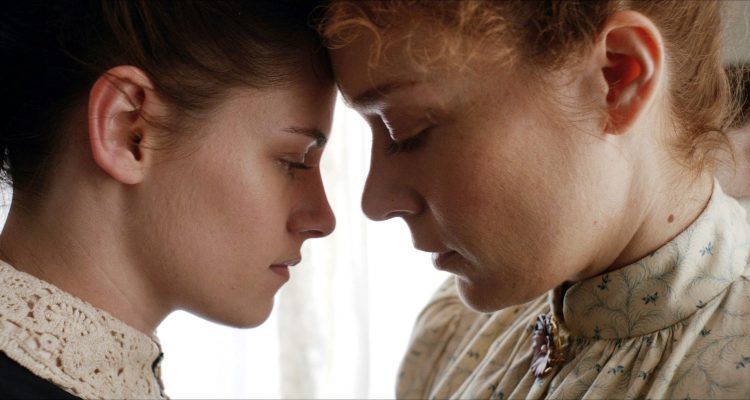A repressive family is destroyed in this more stolid than sordid 19th-century true crime recreation. The 1892 murders of Andrew Borden and his second wife, Abby, scandalized the industrial bay town of Fall River, MA, when Borden’s daughter Lizzie was arrested for the crimes, and echoes of the vicious attack still sound over a century later. With “Lizzie,” producer and star Chloe Sevigny realizes a long-held ambition to bring Lizzie Borden to the screen. While her work is commanding and a dedicated set of tough, engaged performances from the ensemble add life to the odd legend, awkward structural choices bleed away the film’s emotional punch long before the credits roll.
Here is Lizzie Borden: impulsive, stubborn, unafraid. Subject to seizures. Not subject to control. Sevigny draws a detailed portrait, taking hold of Borden’s resentment at familial and social repression to elevate her beyond the crass subject known from schoolyard rhymes. The young woman has long chafed under the control of her penny-pinching and reputation-conscious father (Jamey Sheridan), who runs the Borden home with the strict hand of a schoolmaster. He prohibits, for example, Lizzie attending society events alone. The rule is arbitrary and frustrating. Her pique deepens after she gets her way only to become an involuntary spectacle when a seizure hits as Lizzie watches a performance.
The arrival of new maid Maggie, played by Kristen Stewart, shakes up the Borden household. Lizzie shows interest in the young woman – and also truly sees her, calling out the adopted name “Maggie” as a bland replacement for her true name, Bridget, and taking time to learn about her family. Being seen goes both ways, as Bridget immediately keys in on Lizzie’s stanched development.
Facts drive the script up to a point, but the screenplay by Bryce Kass also draws on the Ed McBain novel “Lizzie,” which sketches a sexual relationship between Lizzie and Bridget. That’s cause for a small flame to smolder between Sevigny and Stewart, which brings color and warmth to the center of the film even as it threatens to tip the tightly controlled scenario into ‘SNL‘ territory.
Under the direction of Craig William Macneill and through the eye of cinematographer Noah Greenberg, Lizzie is dour and desaturated. There’s no color for Lizzie or Bridget; they’re all but trapped in a featureless home. Only a few stray encounters in a barn offer moments of true color.
It’s a bad world, though. Andrew Borden isn’t merely a disciplinarian; he’s vindictive and cruel and has the entitled lecherousness of an abuser. Borden faces revolts in his business, and a relative is sniffing around looking for money. Meanwhile, someone is leaving notes on the Borden family door, threatening a reckoning for unspecified crimes.
Through it all, Sevigny’s Lizzie is nearly a ghost actively haunting her own home, trying to find some way to break into the real world. While “Lizzie” is more interesting than captivating on the page, Sevigny makes all the character’s discontent so insistent and fierce that even a viewer who doesn’t come to the film with knowledge of the murders might root for her to pick up a hatchet. Stewart is more restrained than usual, but the interplay between her and Sevigny is softly energetic, with the upper hand flitting back and forth between the two women as increasing tension in the house drives both women to the limits of sanity.
The whole point, of course, is to see what happens when Lizzie – or someone – goes beyond any common psychological threshold, and the endgame is where the film falters. The scene itself – “the incident,” to borrow from “I, Tonya” – is a stunner, thanks to the vulnerability of the performers and a certain amount of shock value. The aftermath of the killings, however, is a slow, sludgy comedown that undermines the emotional punch of the violence, and the implications of it.
The film’s calculated buildup and release can’t support an extended coda featuring a procedural follow-up and aftermath. The emotions get so big for the infamous moment that everything is on the table at that point, and there’s nowhere to go afterward. “Lizzie” redefines and to some extent redeems the image of its inspiration, but it also undoes some of its own good work in the end. [B-]
Click here for our complete coverage from the 2018 Sundance Film Festival

